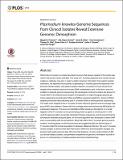Files in this item
Plasmodium knowlesi genome sequences from clinical isolates reveal extensive genomic dimorphism
Item metadata
| dc.contributor.author | Monsanto Pinheiro, Miguel | |
| dc.contributor.author | Ahmed, Md Atique | |
| dc.contributor.author | Millar, Scott B | |
| dc.contributor.author | Sanderson, Theo | |
| dc.contributor.author | Otto, Thomas D | |
| dc.contributor.author | Lu, Woon Chan | |
| dc.contributor.author | Krishna, Sanjeev | |
| dc.contributor.author | Rayner, Julian C | |
| dc.contributor.author | Cox-Singh, Janet | |
| dc.date.accessioned | 2015-04-14T09:31:01Z | |
| dc.date.available | 2015-04-14T09:31:01Z | |
| dc.date.issued | 2015-04-01 | |
| dc.identifier | 180861734 | |
| dc.identifier | cd04a81f-2d06-411b-9f0f-02983b538471 | |
| dc.identifier | 25830531 | |
| dc.identifier | 84926513067 | |
| dc.identifier | 000352135600068 | |
| dc.identifier.citation | Monsanto Pinheiro , M , Ahmed , M A , Millar , S B , Sanderson , T , Otto , T D , Lu , W C , Krishna , S , Rayner , J C & Cox-Singh , J 2015 , ' Plasmodium knowlesi genome sequences from clinical isolates reveal extensive genomic dimorphism ' , PLoS One , vol. 10 , no. 4 , e0121303 . https://doi.org/10.1371/journal.pone.0121303 | en |
| dc.identifier.issn | 1932-6203 | |
| dc.identifier.other | ORCID: /0000-0003-4878-5188/work/64034455 | |
| dc.identifier.uri | https://hdl.handle.net/10023/6478 | |
| dc.description | MMP and Bioinformatics support was provided by the Bioinformatics Unit at St Andrews University funded by a Wellcome Trust ISSF grant 097831/Z/11/Z. This research was funded by Medial Research Council (www.mrc.ac.uk, grant G0801971) (to JCS and SK) and the University of St Andrews. TS, TDO and JCR were supported by the Wellcome Trust (www.wellcome.ac.uk, grant number 098051). TDO was supported by the European Union 7th framework (EVIMalaR) (www.evimalar.org). TS was supported by the Medical Research Council (www.mrc.ac.uk, grant number MR/J500355/1). | en |
| dc.description.abstract | Plasmodium knowlesi is a newly described zoonosis that causes malaria in the human population that can be severe and fatal. The study of P. knowlesi parasites from human clinical isolates is relatively new and, in order to obtain maximum information from patient sample collections, we explored the possibility of generating P. knowlesi genome sequences from archived clinical isolates. Our patient sample collection consisted of frozen whole blood samples that contained excessive human DNA contamination and, in that form, were not suitable for parasite genome sequencing. We developed a method to reduce the amount of human DNA in the thawed blood samples in preparation for high throughput parasite genome sequencing using Illumina HiSeq and MiSeq sequencing platforms. Seven of fifteen samples processed had sufficiently pure P. knowlesi DNA for whole genome sequencing. The reads were mapped to the P. knowlesi H strain reference genome and an average mapping of 90% was obtained. Genes with low coverage were removed leaving 4623 genes for subsequent analyses. Previously we identified a DNA sequence dimorphism on a small fragment of the P. knowlesi normocyte binding protein xa gene on chromosome 14. We used the genome data to assemble full-length Pknbpxa sequences and discovered that the dimorphism extended along the gene. An in-house algorithm was developed to detect SNP sites co-associating with the dimorphism. More than half of the P. knowlesi genome was dimorphic, involving genes on all chromosomes and suggesting that two distinct types of P. knowlesi infect the human population in Sarawak, Malaysian Borneo. We use P. knowlesi clinical samples to demonstrate that Plasmodium DNA from archived patient samples can produce high quality genome data. We show that analyses, of even small numbers of difficult clinical malaria isolates, can generate comprehensive genomic information that will improve our understanding of malaria parasite diversity and pathobiology. | |
| dc.format.extent | 16 | |
| dc.format.extent | 618886 | |
| dc.language.iso | eng | |
| dc.relation.ispartof | PLoS One | en |
| dc.subject | R Medicine | en |
| dc.subject | QH426 Genetics | en |
| dc.subject | DAS | en |
| dc.subject | BDC | en |
| dc.subject | SDG 3 - Good Health and Well-being | en |
| dc.subject.lcc | R | en |
| dc.subject.lcc | QH426 | en |
| dc.title | Plasmodium knowlesi genome sequences from clinical isolates reveal extensive genomic dimorphism | en |
| dc.type | Journal article | en |
| dc.contributor.sponsor | The Wellcome Trust | en |
| dc.contributor.institution | University of St Andrews. School of Medicine | en |
| dc.contributor.institution | University of St Andrews. Gillespie Group | en |
| dc.contributor.institution | University of St Andrews. Biomedical Sciences Research Complex | en |
| dc.contributor.institution | University of St Andrews. Infection Group | en |
| dc.identifier.doi | 10.1371/journal.pone.0121303 | |
| dc.description.status | Peer reviewed | en |
| dc.identifier.grantnumber | 097831/z/11/z | en |
This item appears in the following Collection(s)
Items in the St Andrews Research Repository are protected by copyright, with all rights reserved, unless otherwise indicated.

